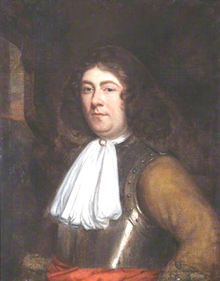John Chichester (politician, 1598)
Sir John Chichester ( December 6, 1598 - September 24, 1669 ) was an English politician.
origin
John Chichester came from a sideline of the Chichester family , an old family of the Gentry of Devon . He was the eldest son of John Chichester and his wife Anne Bassett . His father was a country nobleman whose head office was Hall Estate at Bishop's Tawton . From 1614 Chichester studied at Oxford , where he graduated from Exeter College in 1617 with a bachelor's degree . He then studied at the Temple Inn in London. After the death of his father, he had inherited his property in February 1608. These included two estates and parts of seven other estates in Devon and Cornwall with a total of over 1,000 hectares of land. However, about two fifths of the estate remained as Wittum in the possession of his grandmother and mother Anne, who only died in 1664. His mother had acquired his guardianship from the Crown in November 1608.
Political activity
Through his first marriage to a daughter of Sir William Strode , Chichester came into contact with George Chudleigh , who had married another daughter of Strode. Whose brother-in-law Sir Reginald Mohun had considerable political influence on the Borough Lostwithiel , whereupon Chichester was elected as a member of the Borough in the general election of 1624. Little is known, however, of his work in the House of Commons and there is evidence that he served on only one committee. In the next general election in April 1625, he did not run again. He was knighted in Plymouth on September 16, 1625 , but it is unknown whether he took part in the expedition against Cádiz , which set out from Plymouth in October, during the war with Spain . In 1628 he became Justice of the Peace for Devon, and he also took on various other local offices. Than for 1640 English Civil War came, supported Chichester, the party of King Charles I. He supported the king in 1639 with £ 20 and introduced in 1640 and 1642 in Devon levies on. His brother-in-law, George Chudleigh, was a staunch supporter of Parliament. At the beginning and in June 1643 Chichester and Chudleigh were involved in negotiations for a local armistice in Devon. Apparently both of them withdrew from further fighting afterwards. The victorious parliament fined Chichester £ 2000 in 1647, but it is not known whether this was recovered or whether its properties were confiscated. After the Stuart Restoration , he was reappointed Justice of the Peace and Lord Lieutenant of Devon in 1660 .
Family and inheritance
Chichester was married three times. In his first marriage around 1619 he had married Ursula Strode , a daughter of Sir William Strode from Newnham near Plympton St Mary . With her he had six sons. After the death of his first wife in July 1635, he married Elizabeth Pollard , daughter of Sir Lewis Pollard of King's Nympton in Devon, on November 24, 1635 . With her he had a son and two daughters. After her death in July 1661, he married Susanna († after 1695), the widow of Alexander Rolle from Tawstock, in third marriage . She was the daughter of William Stevens from Great Torrington . He had a daughter with her.
Chichester was buried in Bishop's Tawton, where a funerary memorial in St John the Baptist Church commemorates him. His heir was his eldest surviving son John Chichester (1626–1684), after his childless death his son Francis Chichester (1628–1698) inherited the estates. When he died childless, Arthur Chichester (1670–1737 / 8), a distant cousin, inherited the property.
Web links
- Paul Hunneyball: CHICHESTER, John (1598-1669), of Hall, Bishops Tawton, Devon. (History of Parliament online, Ref Volumes: 1604–1629)
| personal data | |
|---|---|
| SURNAME | Chichester, John |
| ALTERNATIVE NAMES | Chichester, Sir John |
| BRIEF DESCRIPTION | English politician, member of the House of Commons |
| DATE OF BIRTH | December 6, 1598 |
| DATE OF DEATH | November 24, 1669 |

